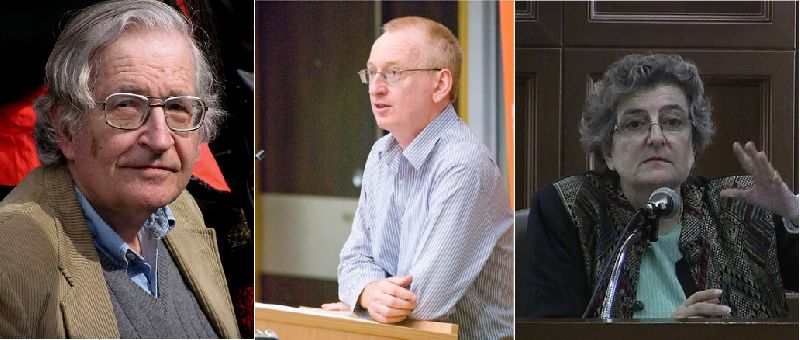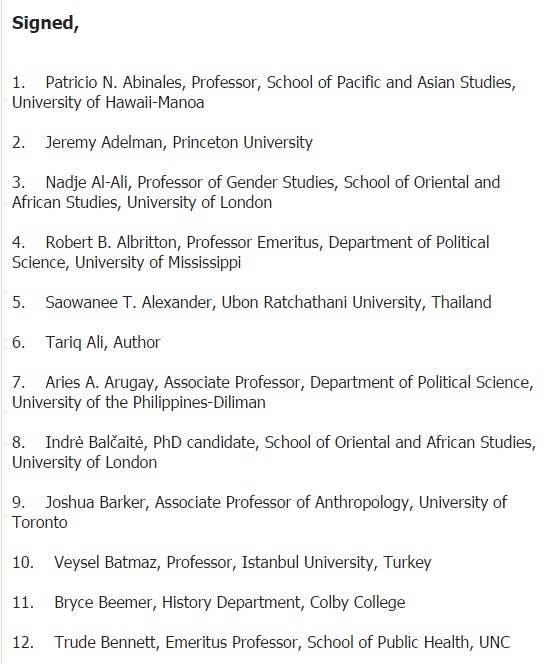
กลุ่ม นักวิชาการ นักเขียน นักคิด จาก19ประเทศ อาทิ นอม ชอมสกี้,แคทเธอรีน โบวี่ ,
ทักษ์ เฉลิมเตียรณ,เควิน ฮิววิสัน,ดันแคน แม็คคาโก ฯลฯ ร่วมออกจม.เปิดผนึก เรียกร้อง
ขอให้เสรีภาพทางวิชาการกลับมาในประเทศไทย
วันที่ 5 มีนาคม 2558 ผู้สื่อข่าวรายงานว่า กลุ่มนักวิชา นักคิด นักเขียน การจำนวน 238 คน จาก 19 ประเทศ
ร่วมกันออกแถลงการณ์ เป็นจดหมายเปิดผนึก ในหัวข้อ "นักวิชาการ นักเขียน นักคิด เรียกร้องขอให้เสรีภาพ
ทางวิชาการกลับมาในประเทศไทย" ซึ่งเผยแพร่เมื่อวันที่ 4 มีนาคม ที่ผ่านมา จากกรณีที่มหาวิทยาลัยธรรมศาสตร์
ได้มีคำสั่งไล่ออก นายสมศักดิ์ เจียมธีรสุกล โดยขอเรียกร้องต่อเสรีภาพทางวิชาการ ซึ่งถ้อยความในแถลงการณ์
ได้กล่าวถึงข้อเท็จจริงที่ว่า
ตลอด 9 เดือนหลังจากที่คสช. ได้ก่อรัฐประหารครั้งล่าสุดในประเทศไทย ซึ่งนับเป็น
รัฐประหารครั้งที่ 13 ตั้งแต่การเปลี่ยนแปลงการปกครอง 24 มิถุนายน 2475 ทางกลุ่มได้ออกมาเรียกร้องขอให้มี
เสรีภาพทางวิชาการในประเทศไทย โดยเสนอข้อเรียกร้องด้วยจิตวิญญาณภราดรภาพและความเคารพต่อความจริง
ซึ่งก่อนหน้านี้ก็มีนักวิชาการไทยจำนวนไม่น้อยที่ออกแถลงการณ์เมื่อสัปดาห์ที่แล้ว หลังจากที่ ดร. สมศักดิ์ เจียมธีรสกุล
ถูกไล่ออกจากตำแหน่งที่มหาวิทยาลัยธรรมศาสตร์อย่างไม่เป็นธรรม กลุ่มนักวิชาการ 238 คนนี้ตั้งข้อสังเกตว่าว่ามี
การจำกัดสิทธิเสรีภาพในการแสดงออกอย่างสูงและอยู่ในภาวะน่าเป็นห่วง พวกเขาวิจารณ์การไล่ดร.สมศักดิ์ออกว่า
เป็นตัวอย่างของความร่วมมือระหว่างมหาวิทยาลัยธรรมศาสตร์และคณะทหาร
ทั้งนี้กลุ่มนักวิชาการ238คนนี้ไม่ได้ยกเสรีภาพทางวิชาการว่ามีความสำคัญเหนือกว่าเสรีภาพในการแสดงออกของ
ประชาชนทุกคนหากแต่พวกเขาตั้งข้อสังเกตว่าการลิดรอนเสรีภาพทางวิชาการเป็นสิ่งที่ยิ่งอันตรายในช่วงนี้ เนื่อง
จากเป็นการ “ขัดขวางการเรียนการสอนของบรรดาอาจารย์และนักศึกษา ที่ภาระหน้าที่ปกติประจำวันคือการคิดและ
การพิจารณาความรู้และความหมาย ก่อให้เกิดการจำกัดจินตนาการและการทำงาน และขัดขวางการกลับคืนสู่ระบอบ
ที่มีการปกป้องสิทธิเสรีภาพเป็นหลัก”
กลุ่ม 238 นักวิชาการ นักคิด และนักเขียนนี้มาจาก 19 ประเทศ ประกอบด้วยประเทศออสเตรเลีย ออสเตรีย แคนาดา
โคลัมเบีย เดนมาร์ก ฝรั่งเศส ญี่ปุ่น มาเลเซีย เนเธอร์แลนด์ ฟิลิปปินส์ สิงคโปร์ เกาหลี สวีเดน ไต้หวัน ประเทศไทย
ตุรกี อังกฤษ และสหรัฐอเมริกา ซึ่งในตอนท้ายของจดหมาย นักวิชาการกลุ่มนี้ เรียกร้องให้มหาวิทยาลัยธรรมศาสตร์
และ ทุกๆ มหาวิทยาลัยในประเทศไทย “ก้าวออกมาเป็นผู้นำในการสนับสนุนเสรีภาพทางวิชาการและเสรีภาพในการ
แสดงออกอย่างกว้างขวาง”พร้อมกับเสนอว่า“
การคิดต่างกันไม่ใช่อาชญากรรมถ้าหากไม่ได้คิดต่างกันในรั้วมหวิทยาลัย
อันเป็นพื้นที่การเรียนการสอนและการแสวงหาความจริงแล้วพื้นที่สำหรับความคิดนอกรั้วมหาวิทยาลัยจะเริ่มหดหายไปเช่นกัน”
[Spoil] คลิกเพื่อดูข้อความที่ซ่อนไว้Scholars, Writers and Thinkers Call for Academic Freedom in Thailand
For immediate release
March 4, 2015
Over nine months after Thailand’s 12th military coup since the end of the absolute monarchy in 1932 was launched by the National Council for Peace and Order (NCPO), 238 scholars, writers and thinkers, issued a call in support of academic freedom in Thailand in solidarity with colleagues inside the country who did so the week before. Catalyzed by the summary firing of prominent historian Dr. Somsak Jeamteerasakul by Thammasat University, they note that there has been a sharp decline in protection of freedom of expression in Thailand since the coup. They are critical of the summary dismissal of Dr. Somsak and comment that it is an example of alignment between the NCPO and Thammasat University.
They do not privilege academic freedom, but note that attacks on it during dictatorship are particularly dangerous as this, “prevents students and scholars, those whose daily job is to think about knowledge and its implications, from imagining and working to return to a democratic regime founded on the protection of rights and liberties.”
The scholars are from 19 countries, including Australia, Austria, Canada, Colombia, Denmark, France, Germany, Japan, Malaysia, Netherlands, the Philippines, Singapore, South Korea, Sweden, Taiwan, Thailand, Turkey, United Kingdom, United States. They conclude with a request for Thammasat University and all universities in Thailand, “to take an active and leading role in support of academic freedom and freedom of expression in a broad sense.” They link academic freedom with freedom of thought and human rights more broadly, and note that, “To think differently is not a crime. If one cannot do so within the walls of the university, spaces of learning and the pursuit of truth, then the space to do so outside those walls will dwindle as well.”
A Call for the Protection of Academic Freedom in Thailand
As concerned international observers of Thailand, we stand in solidarity with our colleagues who have condemned the summary dismissal of Dr. Somsak Jeamteerasakul by Thammasat University on 23 February 2015. We have watched with growing concern as the space for freedom of expression has shrunk precipitously in Thailand since the 22 May 2014 coup by the National Council for Peace and Order (NCPO). By choosing to join with the NCPO to attack Dr. Somsak Jeamteerasakul, the Thammasat University administration has abdicated its responsibility to protect academic freedom and nurture critical thinking. While academic freedom is not worthy of protection greater than that of the right to freedom of expression of all citizens, the impact of its destruction during a time of dictatorship is particularly severe as it prevents students and scholars, those whose daily job is to think about knowledge and its implications, from imagining and working to return to a democratic regime founded on the protection of rights and liberties.
For more than twenty years, Dr. Somsak Jeamteerasakul has been a lecturer in the Department of History and has trained and inspired many students at Thammasat University. As a public intellectual, he has produced a significant body of work in modern Thai history that has impacted and challenged Thai society beyond the walls of the university. His critical stance has made those in power uncomfortable, and in 2011 he faced an accusation from the Army of violating Article 112, the section of the Criminal Code that addresses alleged lèse majesté. In February 2014, there was an attempt on his life when armed gunmen shot at his house and car with automatic weapons. Concerned about his life and liberty following the May 2014 coup, Dr. Somsak fled the country. He was subsequently summoned to report by the junta, and when he did not, the NCPO issued a warrant for his arrest and appearance in military court, as examination of violations of the junta’s orders was placed within the jurisdiction of the military court following the coup. In December 2014, he submitted his resignation. However, rather than accept his resignation, Thammasat University fired Dr. Somsak.
We stand in solidarity with our colleagues who note that, at the very least, Dr. Somsak Jeamteerasakul should be permitted to appeal the decision by Thammasat University to summarily dismiss him. In addition, he should be permitted to fight any legal charges against him in the civilian criminal court, not the military court. We further call on Thammasat University and all universities in Thailand to take an active and leading role in support of academic freedom and freedom of expression in a broad sense. To think differently is not a crime. If one cannot do so within the walls of the university, spaces of learning and the pursuit of truth, then the space to do so outside those walls will dwindle as well.

 http://www.matichon.co.th/news_detail.php?newsid=1425525469
http://www.matichon.co.th/news_detail.php?newsid=1425525469


สุดประทับใจ เมื่อ238นักวิชาการ-นักเขียน-นักคิด ลงชื่อ เรียกร้องขอเสรีภาพทางวิชาการกลับมาในประเทศไทย
กลุ่ม นักวิชาการ นักเขียน นักคิด จาก19ประเทศ อาทิ นอม ชอมสกี้,แคทเธอรีน โบวี่ ,
ทักษ์ เฉลิมเตียรณ,เควิน ฮิววิสัน,ดันแคน แม็คคาโก ฯลฯ ร่วมออกจม.เปิดผนึก เรียกร้อง
ขอให้เสรีภาพทางวิชาการกลับมาในประเทศไทย
วันที่ 5 มีนาคม 2558 ผู้สื่อข่าวรายงานว่า กลุ่มนักวิชา นักคิด นักเขียน การจำนวน 238 คน จาก 19 ประเทศ
ร่วมกันออกแถลงการณ์ เป็นจดหมายเปิดผนึก ในหัวข้อ "นักวิชาการ นักเขียน นักคิด เรียกร้องขอให้เสรีภาพ
ทางวิชาการกลับมาในประเทศไทย" ซึ่งเผยแพร่เมื่อวันที่ 4 มีนาคม ที่ผ่านมา จากกรณีที่มหาวิทยาลัยธรรมศาสตร์
ได้มีคำสั่งไล่ออก นายสมศักดิ์ เจียมธีรสุกล โดยขอเรียกร้องต่อเสรีภาพทางวิชาการ ซึ่งถ้อยความในแถลงการณ์
ได้กล่าวถึงข้อเท็จจริงที่ว่า ตลอด 9 เดือนหลังจากที่คสช. ได้ก่อรัฐประหารครั้งล่าสุดในประเทศไทย ซึ่งนับเป็น
รัฐประหารครั้งที่ 13 ตั้งแต่การเปลี่ยนแปลงการปกครอง 24 มิถุนายน 2475 ทางกลุ่มได้ออกมาเรียกร้องขอให้มี
เสรีภาพทางวิชาการในประเทศไทย โดยเสนอข้อเรียกร้องด้วยจิตวิญญาณภราดรภาพและความเคารพต่อความจริง
ซึ่งก่อนหน้านี้ก็มีนักวิชาการไทยจำนวนไม่น้อยที่ออกแถลงการณ์เมื่อสัปดาห์ที่แล้ว หลังจากที่ ดร. สมศักดิ์ เจียมธีรสกุล
ถูกไล่ออกจากตำแหน่งที่มหาวิทยาลัยธรรมศาสตร์อย่างไม่เป็นธรรม กลุ่มนักวิชาการ 238 คนนี้ตั้งข้อสังเกตว่าว่ามี
การจำกัดสิทธิเสรีภาพในการแสดงออกอย่างสูงและอยู่ในภาวะน่าเป็นห่วง พวกเขาวิจารณ์การไล่ดร.สมศักดิ์ออกว่า
เป็นตัวอย่างของความร่วมมือระหว่างมหาวิทยาลัยธรรมศาสตร์และคณะทหาร
ทั้งนี้กลุ่มนักวิชาการ238คนนี้ไม่ได้ยกเสรีภาพทางวิชาการว่ามีความสำคัญเหนือกว่าเสรีภาพในการแสดงออกของ
ประชาชนทุกคนหากแต่พวกเขาตั้งข้อสังเกตว่าการลิดรอนเสรีภาพทางวิชาการเป็นสิ่งที่ยิ่งอันตรายในช่วงนี้ เนื่อง
จากเป็นการ “ขัดขวางการเรียนการสอนของบรรดาอาจารย์และนักศึกษา ที่ภาระหน้าที่ปกติประจำวันคือการคิดและ
การพิจารณาความรู้และความหมาย ก่อให้เกิดการจำกัดจินตนาการและการทำงาน และขัดขวางการกลับคืนสู่ระบอบ
ที่มีการปกป้องสิทธิเสรีภาพเป็นหลัก”
กลุ่ม 238 นักวิชาการ นักคิด และนักเขียนนี้มาจาก 19 ประเทศ ประกอบด้วยประเทศออสเตรเลีย ออสเตรีย แคนาดา
โคลัมเบีย เดนมาร์ก ฝรั่งเศส ญี่ปุ่น มาเลเซีย เนเธอร์แลนด์ ฟิลิปปินส์ สิงคโปร์ เกาหลี สวีเดน ไต้หวัน ประเทศไทย
ตุรกี อังกฤษ และสหรัฐอเมริกา ซึ่งในตอนท้ายของจดหมาย นักวิชาการกลุ่มนี้ เรียกร้องให้มหาวิทยาลัยธรรมศาสตร์
และ ทุกๆ มหาวิทยาลัยในประเทศไทย “ก้าวออกมาเป็นผู้นำในการสนับสนุนเสรีภาพทางวิชาการและเสรีภาพในการ
แสดงออกอย่างกว้างขวาง”พร้อมกับเสนอว่า“การคิดต่างกันไม่ใช่อาชญากรรมถ้าหากไม่ได้คิดต่างกันในรั้วมหวิทยาลัย
อันเป็นพื้นที่การเรียนการสอนและการแสวงหาความจริงแล้วพื้นที่สำหรับความคิดนอกรั้วมหาวิทยาลัยจะเริ่มหดหายไปเช่นกัน”
[Spoil] คลิกเพื่อดูข้อความที่ซ่อนไว้
http://www.matichon.co.th/news_detail.php?newsid=1425525469